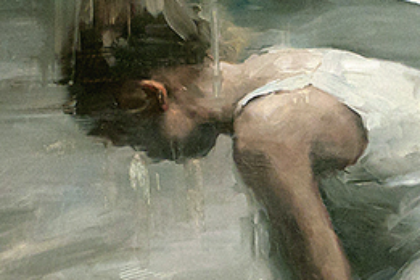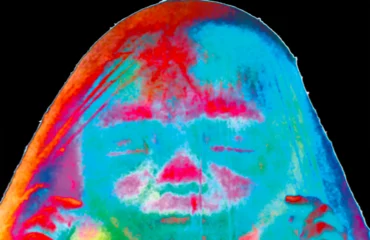TWO POEMS by Patrick Rosal

TEN YEARS AFTER MY MOM DIES I DANCE
The second time I learned
I could take the pain
my six-year-old niece
—with five cavities
humming in her teeth—
led me by the finger
to the foyer and told her dad
to turn up the Pretenders
—Tattooed Love Boys—
so she could shimmy with me
to the same jam
eleven times in a row
in her princess pajamas.
When she’s old enough,
I’ll tell her how
I bargained once with God
because all I knew of grief
was to lean deep
into the gas pedal
to speed down a side road
not a quarter-mile long
after scouring my gut
and fogging my retinas
with half a bottle of cheap scotch.
To those dumb enough
to take the odds against
time, the infinite always says
You lose. If you’re lucky,
time grants you a second chance,
as I was lucky
when I got to hold
the hand of my mother,
how I got to kiss that hand
before I sprawled out
on the tiles of the hallway
in the North Ward
so that the nurses
had to step over me
while I wept. Then again,
I have lived long enough
to turn on all the lights
in someone else’s kitchen
and move my hips in lovers’ time
to the same shameless
Amen sung throughout
the church our bodies
build in sway. And then
there were times all I could do
was point to the facts:
for one, we move
through the universe
at six hundred seventy
million miles per hour
even when we are lying
absolutely still.
Oh magic, I’ve got a broken
guitar and I’m a sucker
for ruin and every night
there’s a barback
who wants to go home
early to bachata
with his favorite girl.
I can’t blame him or the children
who use spoons for drums.
And by the way, that was me
at the Metropolitan stop
on the G. I was the one
who let loose half my anguish
with an old school toprock
despite the fifty-some
strangers all around me
on the platform
waiting for the train
about to trudge again
through the city’s winter
muck. Sure, I set it off
in my zipped up three-quarter
coat when that big girl
opened the thunder in her lungs
and let out her badass
banjo version of the Jackson Five,
all of which is to say, thank you
for making me the saddest man
on a planet teeming with sadness.
The night, for example,
I twirled a mostly deaf woman
in a late-night lounge
on the Lower East Side
and listened to her whisper
a melody she was making up
to a rhythm she told me
she could feel through her chest,
how we held each other there
on a crowded floor
until the lights came up
as if we were never dancing
to the same sorrows
or even singing
a different song.
UPTOWN ODE THAT ENDS ON AN ODE TO THE MACHETE
What happens when me and Willie
run into each other on a Wednesday night
in Brooklyn? He asks, “Where we going?”
And that’s not really a question.
That’s an ancestral imperative: to hail
any yellow or gypsy that’ll stop on Franklin
and Lincoln to fly us over the bridge then
zip up the East Side where the walls
are knocking to Esther Williams or Lavoe.
And you know Willie daps up Orlando
and I say What’s good! and it don’t take
three minutes for me and Will to jump
on the dance floor or post up at the bar
sipping on Barrilito or to tap on my glass
a corny cáscara with a butterknife
like I’m Tito Puente but I have no clue
I really sound like a ’78 Gremlin
dragging its tailpipe the length of 119th,
which is to say, it don’t take long
for Willie and me to be all in. And that’s when
out of nowhere in the middle of the room’s boom-
braddah macumba candombe bámbula
this Puerto Rican leans over and says to me
real slow, “Everybody is trying to get
home.” And I’m like, “Aw fuck.” because
I’m on 1st Ave between 115th and 116th
not even invested in the full swerve yet.
It’s not even five past midnight and Will
is dropping science like that. Allow me
to translate: There are neighborhoods in America
where a man says one simple sentence
and out flow the first seventeen discrete meanings
of home. If you haven’t been broken by the ocean,
if your own weeping doesn’t split you down
into equal weathers: monsoon, say, and gossip,
if you can’t stand at the front door
of an ancestral house and see a black saint
staring down at you, no name, no judgment,
if you haven’t listened to the town drunks
laughing underneath a tree they planted
so they wouldn’t forget your pain, then your story
must have a whole other set of secrets.
You must know what it’s like to expect
an invitation. You might not know what it’s like
to wonder if someone is even waiting
for you to return. Your idea of home
might not contain ways to call blood cousins
from another time zone or just shout
from the middle of the road. There are those of us
descended from peasants who never had to travel
too far to visit the smiths who craft knives
from hilt to tip, who cook blades
that split the wood or carve the rind
from flesh. I once went to visit the men
who make the machetes of the Philippines.
There was a time, I didn’t care where
those knives came from, how the men and women
stoked the embers and dropped their mallets
with a millimeter’s precision. When I was young,
I thought hard was the mad-dog you could send
across a crowded bar. I thought hard
was how deep you roll or how nasty the steel
you bring. In some neighborhoods of America,
hard is turning down the fire just enough,
so you could kiss the knife and make it ring.
Issue 6 Contents NEXT: Reprise by Kathleen Hellen
